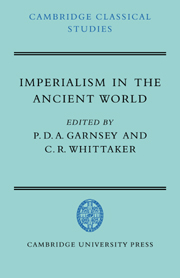Book contents
- Frontmatter
- Contents
- List of figures
- Preface
- 1 INTRODUCTION
- 2 IMPERIALISM AND EMPIRE IN NEW KINGDOM EGYPT
- 3 CARTHAGINIAN IMPERIALISM IN THE FIFTH AND FOURTH CENTURIES
- 4 SPARTAN IMPERIALISM?
- 5 THE FIFTH-CENTURY ATHENIAN EMPIRE: A BALANCE SHEET
- 6 ATHENS IN THE FOURTH CENTURY
- 7 THE ANTIGONIDS AND THE GREEK STATES, 276–196 B.C.
- 8 LAUS IMPERII
- 9 GREEK INTELLECTUALS AND THE ROMAN ARISTOCRACY IN THE FIRST CENTURY B.C.
- 10 THE BENEFICIAL IDEOLOGY
- 11 ROME's AFRICAN EMPIRE UNDER THE PRINCIPATE
- 12 JEWISH ATTITUDES TO THE ROMAN EMPIRE
- Notes
- Bibliography
- Index
8 - LAUS IMPERII
Published online by Cambridge University Press: 05 June 2014
- Frontmatter
- Contents
- List of figures
- Preface
- 1 INTRODUCTION
- 2 IMPERIALISM AND EMPIRE IN NEW KINGDOM EGYPT
- 3 CARTHAGINIAN IMPERIALISM IN THE FIFTH AND FOURTH CENTURIES
- 4 SPARTAN IMPERIALISM?
- 5 THE FIFTH-CENTURY ATHENIAN EMPIRE: A BALANCE SHEET
- 6 ATHENS IN THE FOURTH CENTURY
- 7 THE ANTIGONIDS AND THE GREEK STATES, 276–196 B.C.
- 8 LAUS IMPERII
- 9 GREEK INTELLECTUALS AND THE ROMAN ARISTOCRACY IN THE FIRST CENTURY B.C.
- 10 THE BENEFICIAL IDEOLOGY
- 11 ROME's AFRICAN EMPIRE UNDER THE PRINCIPATE
- 12 JEWISH ATTITUDES TO THE ROMAN EMPIRE
- Notes
- Bibliography
- Index
Summary
THE NATURE OF THE EVIDENCE
My purpose in this paper is to explore the conceptions of empire prevalent in Cicero's day. What Romans thought is often best ascertained from their institutions and actions, and some use will be made of this kind of evidence; it is necessarily inferential, and there is always a danger of reading into the actions of Greeks and Romans motives of too modern a kind. However this may be, I propose to draw principally on actual statements by Romans, as the clearest indications of what was most explicit in their own consciousness; how far this reveals the true driving forces in their imperial conduct is another matter, which may be left to bolder inquiry.
Only two authors supply much material: Cicero and Caesar. It may indeed be remembered that Virgil, Horace and Livy all matured in Cicero's lifetime, and that Livy may often reflect the views of annalists of this or of a still earlier period; moreover I believe that the imperial ideals of the Augustan age were much the same as those of the late republic. Still, citations of these writers will be subsidiary. It remains, however, to ask how far the utterances of Cicero and Caesar can be regarded as representative of their time. Any assumption that they actually held typical views themselves may appear unwarranted and indeed implausible.
- Type
- Chapter
- Information
- Imperialism in the Ancient WorldThe Cambridge University Research Seminar in Ancient History, pp. 159 - 192Publisher: Cambridge University PressPrint publication year: 1979
- 13
- Cited by

